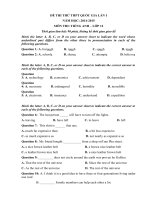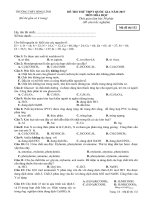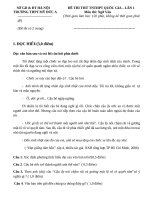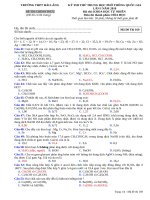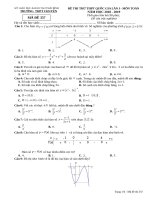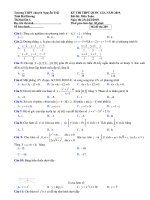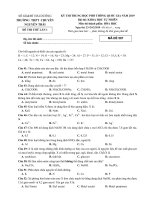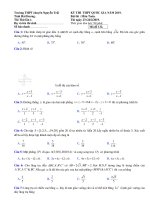De 3 va DA thi Anh thu THPT Quoc Gia lan I 1718 Tr Nguyen Trai
Bạn đang xem bản rút gọn của tài liệu. Xem và tải ngay bản đầy đủ của tài liệu tại đây (142.46 KB, 5 trang )
SỞ GD & ĐT THÁI BÌNH
ĐỀ THI THỬ TNTHPT QUỐC GIA
TRƯỜNG THPT NGUYỄN TRÃI
NĂM HỌC 2017- 2018
MÔN: ANH 12
Thời gian làm bài: 60 phút
Mã đề thi 001
Họ, tên thí sinh:..........................................................................
Số báo danh:...............................................................................
Mark the letter A, B, C or D on the answersheet to indicate the word
whose underlined part differs from the other three in pronunciation in
each of the following sentences.
Question 1: A. adventure
B. future
C. mature
D. figure
Question 2: A. foot
B. book
C. shoot
D. boot
Mark the letter A, B, C, or D on your answer sheet to indicate the word that differs from the other
three in the position of primary stress in each of the following questions.
Question 3: A. open
B. happen
C. offer
D. begin
Question 4: A. popular
B. concentrate
C. comfortable
D. technology
Mark the letter A, B, C, or D on your answer sheet to indicate the correct answer to each of the
following questions.
Question 5: He is the postman _____ I got this letter.
A. from who
B. to whom
C. from whom
D. with whom
Question 6: : _______ the students in my class enjoy taking part in social activities.
A. Most
B. Many
C. Most of
D. The number of
Question 7: Many species of plants and animals are in___________ of extinction.
A. dangerous
B. endangered
C. danger
D. dangerously
Question 8: I studied English for four years at high school. _______, I had trouble talking with people
when I was travelling in the US.
A. Therefore
B. Otherwise
C. Although
D. However
Question 9: Had I studied harder, I_________________better in the last exam.
A. would do
B. would have done C. had done
D. wouldn’t have done
Question 10: On _______ Sunday, my father stays in _______ bed till ten o’clock, reading _______
Times.
A. the/a/x
B. the/x/x
C. x/the/x
D. x/x/the
Question 11: The larger the apartment, the __________________ the rent is.
A. expensive
B. more expensive
C. expensively
D. most expensive
Question 12: We bought some _______.
A. German old lovely glasses
B. lovely old German glasses
C. German lovely old glasses
D. old lovely German glasses
Question 13: Not only __________ air pollution but it also does harm to our health.
A. car exhaust cause
B. car exhaust causes
C. does car exhaust cause
D. do car exhaust cause
Question 14 : They __________by the time we _______.
A. had finished working/ came
B. had finished to work/ come
C. finished working/ had come
D. have finished work/ will come
Question 15 : We usually do go by train, even though the car _________ is a lot quicker.
A. travel
B. journey
C. trip
D. voyage
Question 16 : I just can't ______ that noise any longer!
A. put up with
B. stand in for
C. sit out
D. stand up to
Mark the letter A, B, C, or D on your answer sheet to indicate the underlined part that needs
correction in each of the following questions.
Question 17: Because the expense of traditional fuels, many countries have been investigating
alternative sources of power.
A. Because
B. traditional
C. sources
D. have been investigating
Question 18: The oceans contain many forms of life that has not yet been discovered.
A . oceans
B . forms
C. has
D . yet
Question 19: You can apply for a better job when you will have had more experience.
A. apply for
B. more experience
C. will have had
D. when
Mark the letter A, B, C, or D on your answer sheet to indicate the word or phrase that is CLOSEST in
meaning to the underlined part in each of the following questions.
Question 20: “He insisted on listening to the entire story”.
A. part
B. funny
C. whole
D. interesting
Question 21: School uniform is required in most of Vietnamese schools.
A. divided
B. depended
C. compulsory
D. paid
Mark the letter A, B, C, or D on your answer sheet to indicate the word or phrase that is OPPOSITE
in meaning to the underlined part in each of the questions.
Question 22: The twin girls are so identical that I can't distinguish one from the other.
A. changeable
B. similar
C. alike
D. different
Question 23: After five days on trial, the court found him innocent of the crime and he was released.
A. benevolent
B. guilty
C. innovative
D. naive
Mark the letter A, B, C, or D on your answer sheet to indicate the most suitable response to complete
each of the following exchanges.
Question 24: Minh : " My first English test was not as good as I expected "
Thomas : " _________."
A. Good Heavens!
B. Never mind, better job next time!
C. That's brilliant enough!
D. It's okay . Don't worry.
Question 25: “Excuse me, is anybody sitting here?”
– “____________ .”
A. Yes, I am so glad.
B. No, thanks.
C. Sorry, the seat is taken.
D. Yes, yes. You can sit here.
Mark the letter A, B, C, or D on your answer sheet to indicate the sentence that is CLOSEST in
meaning to the sentence given in each of the following questions.
Question 26: The demand was so great that they had to reprint the book immediately.
A. They will reprint the book immediately.
B. They demand that the book will be reprinted immediately.
C. So great was the demand that they had to reprint the book immediately
D. The book is demand tobe reprinted immediately.
Question 27: You should take a torch because the car might break down at night.
A. In case the car breaks down at night, you should take a torch.
B. If the car will break down at night, you should take a torch.
C. If the car break down at night, you should take a torch.
D. In case the car break down at night, you should take a torch.
Question 28: Had the advertisement for our product been better, more people would have bought it.
A. Not many people bought our product because it was so bad.
B. Our product was of better quality so that more people would buy it.
C. Fewer people bought our product due to its bad quality.
D. Since our advertisement for our product was so bad, fewer people bought it.
Mark the letter A, B, C, or D on your answer sheet to indicate the sentence that best combines each
pair of sentences in the following sentences.
Question 29: We had planned to walk right round the lake. The heavy rain made this impossible.
A. In spite of the fact that we had planned to walk right round the lake, the heavy rain made this
possible.
B. We had planned to walk right round the lake, therefore, the heavy rain made this impossible.
C. We had planned to walk right round the lake, but the heavy rain made this impossible.
D. Even though we had planned to walk right round the lake, but the heavy rain made this impossible.
Question 30 : James did not come. He did not call either.
A. James did not come, so he did not call.
B. James did not come and he did not call, too.
C. James did not came but he called afterwards.
D. James neither came nor called.
Read the following passage and mark the letter A, B, C, or D on your answer sheet to choose the
word or phrase that best fits each of the numbered blanks.
We are using up the world’s petroleum. We use it in our cars and to heat our building in winter.
Farmers use petrochemicals to (31) ____ the soil rich. They use them to kill insects which eat plants.
These chemicals go (32) ______ rivers and lakes and kill the fish there. Thousands of pollutants also go
into the air and pollute it. Winds carry this (33) _____ air to other countries and other continents.
Poor farmers use the same land over and over The land needs a rest so it will be better next year.
However, the farmers must have food this year. Poor people cut down forests for firewood. In some
areas when the trees are gone, the land (34) ______ desert. Poor people can’t save the environment for
the future .
This is not a problem for one country or one area of the world. It is a problem for all- humans. The people and
the nations of the world must work together to (35) _______ the world’s resources.
Question 31. A. work
Question 32. A. out
B. change
B. for
C. make
C. at
D. let
D. into
Question 33. A. pollute
B. polluting
C. polluted
D. pollution
Question 34. A. gets
B. changes
C. turns
D. becomes
Question 35. A. recycle
B. preserve
C. keep
D. reuse
Read the following passage and mark the letter A, B, C or D on your answer sheet to indicate the
correct answer to each of the following questions from 36 to 43.
Since water is the basis of life, composing the greater part of the tissues of all living things, the
crucial problem of desert animals is to survive in a world where sources of flowing water are rare. And
since man’s inexorable necessity is to absorb large quantities of water at frequent intervals, he can
scarcely comprehend that many creatures of the desert pass their entire lives without a single drop.
Uncompromising as it is, the desert has not eliminated life but only those forms unable to
withstand its desiccating effects. No moist- skinned, water-loving animals can exist there. Few large
animals are found. The giants of the North American desert are the deer, the coyote, and the bobcat.
Since desert country is open, it holds more swift-footed running and leaping creatures than the tangled
forest. Its population is largely nocturnal, silent, filled with reticence, and ruled by stealth. Yet they are
not emaciated.
Having adapted to their austere environment, they are as healthy as animals anywhere else in the
word. The secret of their adjustment lies in the combination of behavior and physiology. None could
survive if, like mad dogs and Englishmen, they went out in the midday sun; many would die in a matter
of minutes. So most of them pass the burning hours asleep in cool, humid burrows underneath the
ground, emerging to hunt only by night. The surface of the sun-baked desert averages around 150
degrees, but 18 inches down the temperature is only 60 degrees.
Question 36: The title for this passage could be
.
A. “Animal Life in a Desert Environment”
B. “Desert Plants”
C. “Man’s Life in a Desert Environment”
D. “Life Underground”
Question 37 : The word “tissues” in the passage mostly means
.
A. “the smallest units of living matter that can exist on their own”
B. “the simplest forms of life that exist in air, water, living and dead creatures and plants”
C. “collections of cells that form the different parts of humans, animals and plants”
D. “very small living things that cause infectious disease in people, animals and plants”
Question 38: The phrase “those forms” in the passage refers to all of the following EXCEPT
A. many large animals
B. water-loving animals
C. moist-skinned animals
D. the coyote and the bobcat
Question 39: According to the passage, creatures in the desert
.
A. are more active during the day than those in the tangled forest
B. are not as healthy as those anywhere else in the world
C. run and leap more slowly than those in the tangled forest
D. run and leap faster than those in the tangled forest
Question 40: The author mentions all the following as examples of the behavior of desert animals
EXCEPT
.
A. they dig home underground
B. they sleep during the day
C. they are watchful and quiet
D. they are noisy and aggressive
Question 41: The word “emaciated” in the passage mostly means
.
A. “living or growing in natural conditions, not kept in a house or on a farm”
B. “large and strong, difficult to control or deal with”
C. “thin and weak because of lack of food and water”
D. “able to get what one wants in a clever way, especially by tricking or cheating”
Question 42: The word “burrows” in the passage mostly means
.
A. “places where a particular type of animal or plant is normally found”
B. “holes or tunnels in the ground made by animals for them to live in”
C. “places where insects or other small creatures live and produce their young”
D. “structures made of metal bars in which animals or birds are kept”
Question 43 : We can infer from the passage that
.
A. desert life is colorful and diverse
B. living things adjust to their environment
C. healthy animals live longer lives
D. water is the basis of desert life
Read the following passage and mark the letter A, B, C, or D on your answer sheet to indicate the
correct answer in each of the questions from 44 to 50.
The growth of cities, the construction of hundreds of new factories, and the spread of railroads in
the United States before 1850 had increased the need for better illumination. But the lighting in
American homes had improved very little over that of ancient times. Through the colonial period, homes
were lit with tallow candles or with a lamp of the kind used in ancient Rome- a dish of fish oil or other
animal or vegetable oil in which a twisted rag served as a wick. Some people used lard, but they had to
heat charcoal underneath to keep it soft and burnable. The sperm whale provided superior burning oil,
but this was expensive. In 1830 a new substance called “camphene” was patented, and it proved to be an
remained expensive, had an unpleasant odor, and also was dangerously explosive.
Between 1830 and 1850 it seemed that the only hope for cheaper illumination in the United States
was the wider use of gas. In the 1840s American gas manufacturers adopted improved British techniques
for producing illuminating gas from coal. But the expense of piping gas to the consumer remained so high
that until mid- century gas lighting was feasible only in urban areas, and only for public buildings for the
wealthy. In 1854 a Canadian doctor, Abraham Gesner, patented a process for distilling a pitch like mineral
found in New Brunswick and Nova Scotia that produced illuminating gas and an oil that he called
“kerosene” (from “keros”, the Greek word for wax, and “ene” because it resembled camphene).
Kerosene, though cheaper than camphene, had an unpleasant odor, and Gesner never made his fortune
from it. But Gesner had aroused a new hope for making illuminating oil from a product coming out of
North American mines.
Question 44 : Which of the following is NOT mentioned as a reason why better lighting had become
necessary by the mind- nineteenth century?
A. development of railroads
B. demand for better medical facilities
C. increases in the number of new factories
D. growth of cities
Question 45 : The phrase “served as” inline 5 is closest meaning to __________.
A. differed from
B. functioned as
C. rested upon
D. reacted to
Question 46 : The word “this” in line 6 refers to __________.
A. lard
B. charcoal
C. wick
D. oil
Question 47 : What can be inferred about the illuminating gas described in the paragraph?
A. It was first developed in the United States.
B. It was not allowed to be used in public buildings.
C. It was not widely available until mid- century. D. It had an unpleasant smell.
Question 48 : The word “resembled” in line 15 is closest in meaning to__________.
A. was similar to
B. cost the same as C. was made from
D. sounded like
Question 49 : The word “it” in line 16 refers to__________.
A. fortune
B. odor
C. camphene
D. kerosene
Question 50 : Which of the following best describes the organization of the passage?
A. a description of events in chronological order
B. a comparison of two events
C. an analysis of scientific findings
D. the statement of a theory and possible explanations
----------- HẾT ----------

